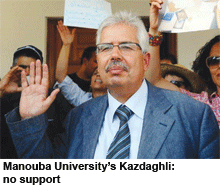The trial of a university dean has raised concerns about the future of higher education in Tunisia and the longer-term plans of the dominant Ennahda (Renaissance) Party.
It was in Tunisia that street vendor Mohamed Bouazizi set fire to himself on December 17, 2010 in protest against ill treatment by local police, thereby sparking the regionwide wave of demonstrations that became known as the Arab Spring. And it was Tunisia which witnessed the first change of regime, on January 14, 2011, when President Zine El Abidine Ben Ali ended his 23-year dictatorship and went into exile in Saudi Arabia. The elections of October 23, 2011 brought to power a ‘troika’ government led by President Moncef Marzouki, prime minister Hamadi Jebali and Mustapha Ben Jafar as leader of the Constituent Assembly, although with Ben Ali’s former prime minister Mohamed al-Ghannushi as a major power behind the scenes.
Rob Prince, a lecturer at the University of Denver’s Josef Korbel School of International Studies, lived in Tunisia as a Peace Corps volunteer almost 50 years ago and has often used the contrast between oil-rich Algeria and oil-less Tunisia as a case history in his courses on development. He decided to return to the country for a month not long after last year’s elections. “I went with a very positive sense of what was going on,” he recalls. “The election itself seemed fair and open. A coalition of Islamicists and more secularist elements seemed realistic.”
 What Prince discovered, however, was that while “politics on a formal level was based on a coalition between more secular and Islamist forces, the real coalition was between the (moderate Islamicist) Ennahda Party and the (strict, traditional) Salafists”. One of the clear signs of this was “challenges to the university system” from those who wanted to “reshape (higher education) in Tunisia along Islamic lines”, says Prince.
What Prince discovered, however, was that while “politics on a formal level was based on a coalition between more secular and Islamist forces, the real coalition was between the (moderate Islamicist) Ennahda Party and the (strict, traditional) Salafists”. One of the clear signs of this was “challenges to the university system” from those who wanted to “reshape (higher education) in Tunisia along Islamic lines”, says Prince.
Although there was suggestion of a coordinated national campaign for more Islamic education, it was the demonstrations at Manouba University that were “at the front line and in the public eye”. The university was most likely targeted because the faculty board had just banned female students from wearing the niqab in class or during exams.
Prince had heard reports of trespass, vandalism and intimidation at the campus, and when he went to see what was happening, he found “the Salafists were very aggressive, in people’s faces, blocking entrances”. “The problem was not so much their demands but that they seemed to have been given a green light. Habib Kazdaghli (the dean of Manouba’s faculty of letters, arts and humanities) was left to defend himself, with no support from the state to challenge what was going on,” says Prince.
On March 6 this year, two veiled students entered Prof. Kazdaghli’s office and allegedly started destroying some papers. According to the professor, when he reported the incident to the police, one of the young women called an ambulance and accused him of assaulting her. Kazdaghli was subsequently arrested and charged. Then, during the initial hearing on July 5 — at which the student alleging the assault failed to appear — the charge was altered to “violence perpetrated by a civil servant in the course of his duties”, thereby increasing the possible prison sentence from 15 days to five years.
On October 24, the day before Prof. Kazdaghli’s trial was set to begin, the Paris-based magazine Jeune Afrique published an outspoken interview with him in which he claimed his “trial was an attempt to bring into line the Tunisian university system… Manouba is a symbol of modernity, while the attacks on it were targeting knowledge and a Tunisian tradition of progress and openness”.
The Salafists and their allies, on the other hand, he said, were putting forward an “Afghan” social policy which had been rejected by the country since the 19th century. Although Kazdaghli said the ministry had failed in its statutory duty to provide him with representation in court, he had received “invaluable support” from civil society, the Tunisian League of Human Rights and legal volunteers.
In the same issue of Jeune Afrique which carried the interview with Prof. Kazdaghli, 91-year-old historian Mohamed Talbi, former rector of the University of Tunis, spelled out what he saw as the threats to Tunisia’s future. Dismissing the troika as “a diabolic trinity”, he warned of plans for a “theocratic dictatorship” and, although a committed Muslim, regretted that “no party had taken a firm stance in favour of laïcité (separation of mosque and state)”.
According to Talbi, the national identity includes Carthagian, Christian and Roman as well as Islamic strands. Yet the Salafists seem to want to “sweep away the whole country, apart from their mosques”.
The stakes could hardly be higher, and higher education is one of the main terrains where the initial battles are being fought.
(Excerpted and adapted from Times Higher Education)


























